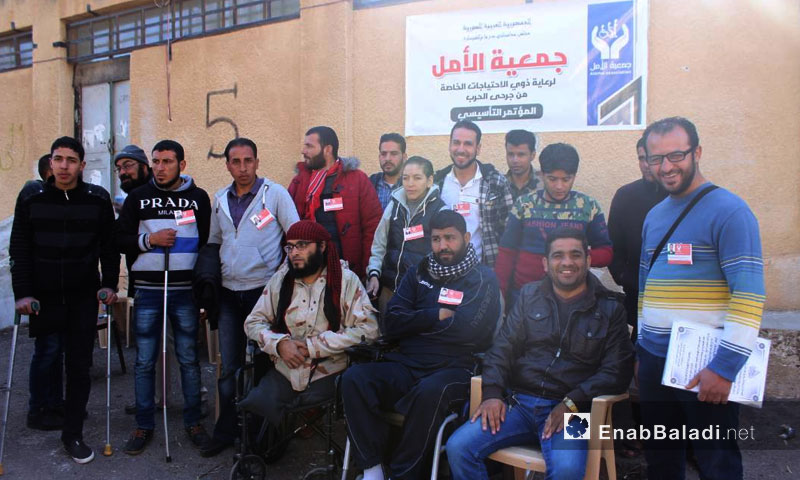Counting on his crutch, the young Jihad al-Nabelssi from Daraa works as a fuel seller in the countryside of the governorate, after he lost his right leg in the explosion of a landmine while farming, which has been his family’s profession for many years. However, Jihad failed to receive a prosthesis similar to many other people who have been disabled or lost a body part during the war in southern Syria.
“Al-Amal” Association for the Care of War Wounded People in Southern Syria has been recently established to be the first entity to care for this social segment. After the official announcement of its establishment a few weeks ago (17 December 2017), the Association’s center, in the al-Telawiah neighborhood in the town of Muzayrib, started to receive various people with various types of war-injuries including paralysis, amputation, eye and ear injuries, cerebral hemorrhage, cancer, etc.
After the farming machinery he was riding exploded, Jihad could not work anymore. He tells Enba Baladi, that he failed to have a prosthesis to the date. “There was a small center that used to fit prostheses in the town of Tasil, but it has been closed for lack of funding. Most of the people cannot go to Jordan for treatment due to high expenses and the absence of financial support,” he added showing optimism after the establishment of the Association.
Action Team Consisting of People with Disabilities
What makes the Association different is that its staff consists of people with permanent disabilities says Iyad Ghezlan, a member of the Founding Committee and the Secretary of the Association, whose ankle and heel have been amputated during the war years ago. The Association’s staff consists of 15 people, seven of whom are board members and other five head the Documentation Committee, in addition to three typical volunteer people, a nurse, pharmacist and a journalist.
The team has a plan to document the numbers of people with motor, sensory and mental disabilities in the two governorates of Daraa and Quneitra. In relation to this, Ghezlan said that the Association has started to evaluate these people’s needs, including medicines, medical supplies, covering the tuition fees for some of them, in addition to training them to personal care activities and providing those who are able to work with jobs, such as maintaining computers and tablets or within recycling, as well as clothes and shoes manufacturing workshops.”
According to its Secretary, the Association has so far documented 700 cases, which are steadily increasing. He pointed out that some of the people have received wheelchairs, walkers, crutches and other devices through donations of those he described as “good people” and the help of some concerned entities.
“Al-Amal” Association’s team works without coordination with any entity. Ghezlan wishes to achieve a cooperation with the local councils of Daraa and Quneitra, and the rest of the local councils and the Civil Society Organizations in an attempt to reach the goal of participation, equality and development in social life.
The Association’s Chairman suffers from quadriplegia and his deputy’s legs are mutilated. The Association runs media, documentation, healthcare, coordination offices and committees; all its members, who have disabilities, either paralysis or mutilation, aim to initiate a center for the treatment of people with disabilities and to provide the medical supplies for each case, in addition to conducting small projects to activate their role and integrate them into society.
According to Ghezlan, the team looks forward to establishing a kindergarten for children who have been injured during the war and to construct a building for the Association that accommodate all its activities, as well as enhancing the role of craftsmen and handicraft workers, who also have war injuries.
What the area demands, according to Jihad, is supporting medical entities; he believes that the priority now is for providing prostheses and physical therapy, “after that the people who have got war-related disabilities can then start searching for jobs that suit them.” He pointed out that the new Association managed to provide these people with jobs, “so it would contribute to bettering their financial conditions and increase their chances of finding the profession that would help them make a living.”

